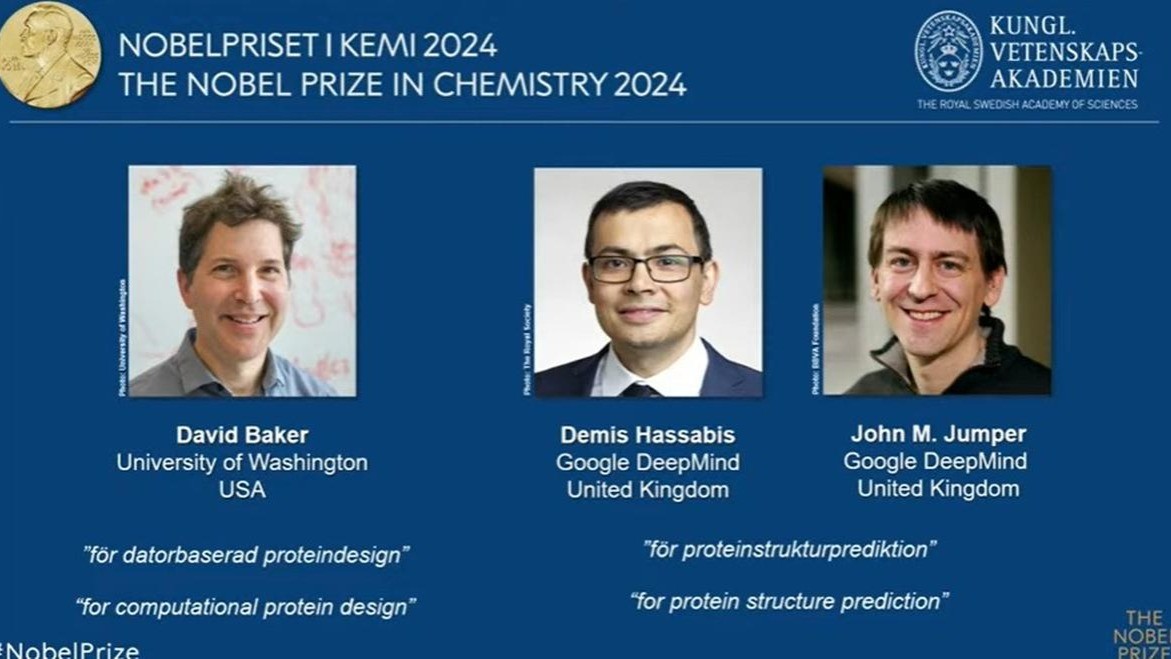
October 9, 2024
Jiajie Zhang, PhD
Dean and Professor
Glassell Family Foundation Distinguished Chair in Informatics Excellence
McWilliams School of Biomedical Informatics
University of Texas Health Science Center at Houston (UTHealth Houston)
In what can only be described as a transformative moment for both science and society, AI has won its second Nobel Prize this week—this time in Chemistry. Following yesterday’s groundbreaking announcement that the 2024 Nobel Prize in Physics was awarded to John J. Hopfield and Geoffrey Hinton for their foundational work on artificial neural networks, today’s Chemistry Award went to David Baker, Demis Hassabia, John M. Jumper for their work on AlphaFold, further solidifies AI’s place at the forefront of modern innovation.
The Chemistry Prize: A Historic Win for AI
According to the Nobel Committee's press release here, this year’s Nobel Prize in Chemistry has been awarded to a team that harnessed AI to design novel enzymes and molecules that revolutionize everything from pharmaceuticals to green energy. The team’s use of deep learning and generative AI models in molecular synthesis has dramatically accelerated the pace of discovery, allowing scientists to explore chemical spaces that were previously unimaginable.
This is a monumental leap for the world of chemistry, where traditional methods of drug discovery or material design could take years or even decades. With AI, what once took years can now be accomplished in a fraction of the time, paving the way for new treatments, sustainable chemicals, and energy solutions.
AI’s Expanding Impact Across Disciplines
This rapid succession of Nobel Prizes in Physics and Chemistry highlights the “James Watt Moment for Cognition – the AI Revolution”. AI, once seen as an esoteric branch of computer science, has now evolved into a fundamental tool that accelerates research across all scientific fields and transforming all sectors of the society.
Yesterday’s Physics Award recognized the foundational work that started in the 1980s with Hopfield’s neural networks and Hinton’s Boltzmann machines. Their work, deeply rooted in physics, laid the groundwork for what would become today’s AI revolution. Now, only a day later, we see AI’s reach expanding into the world of chemistry with tangible results that are already transforming industries like pharmaceuticals, materials science, and energy.
From Concepts to Real-World Applications
The timing of these two awards cannot be understated. The recognition of AI’s role in both Physics and Chemistry underlines a new era where computational methods drive not just theoretical breakthroughs but also real-world applications.
In Physics, AI is helping us understand the fundamental principles of the universe through pattern recognition and prediction, as seen in Hinton’s and Hopfield’s work. In Chemistry, it’s redesigning how we create life-saving drugs, sustainable chemicals, and advanced materials.
The convergence of AI with traditional scientific disciplines is rapidly ushering in an era where the boundaries between fields are blurred, and interdisciplinary collaboration becomes essential.
The Cognitive Revolution Continues
These back-to-back Nobel Prize wins mark an acceleration in what I’ve previously called the Cognitive Revolution—the third fundamental economic shift in human history. With AI as its catalyst, this revolution promises to reshape not only our economies but also how we think about knowledge, discovery, and innovation.
As a scientist who witnessed early AI research firsthand during my graduate school time at the Institute for Cognitive Science at UC San Diego, I’m both amazed and inspired by how far the field has come. The world may not have been ready for an AI revolution in the 1980s, but today, there’s no denying it’s here. AI is no longer just a technology; it is now a transformative force that is driving humanity toward a new future.
The Nobel Committee’s recognition of AI’s role in two of the most prestigious scientific awards speaks volumes about the era we are entering. This is only the beginning, and I’m eager to see where AI will take us next.
Let’s celebrate this week’s historic milestones in human achievement and look forward to the continued evolution of AI across every facet of society.
Related Reading on This Topic: